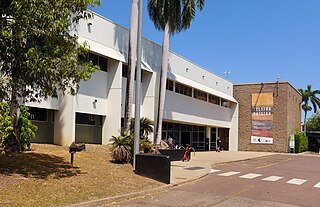This list of museums in the Northern Territory, Australia contains museums which are defined for this context as institutions (including nonprofit organizations, government entities, and private businesses) that collect and care for objects of cultural, artistic, scientific, or historical interest and make their collections or related exhibits available for public viewing. Also included are non-profit art galleries and university art galleries.
| Name | Location | Type | Summary |
|---|---|---|---|
| Adelaide House | Alice Springs | Medical | website, information, bush nursing hostel designed by John Flynn and operated by the Australian Inland Mission |
| Adelaide River railway station | Adelaide River | Railway | Preserved historic railway station and railway artefacts |
| Araluen Arts Centre | Alice Springs | Art | Includes four galleries |
| Australian Aviation Heritage Centre | Winnellie, Northern Territory | Aerospace | website |
| Batchelor Museum | Batchelor | Local history | website, museum under development |
| Battery Hill Mining Centre | Tennant Creek | Mining | information, information, includes underground mine tour, gold stamp, minerals museum, social history museum |
| Black Point Culture Centre | Cobourg Peninsula | Local history | information, located at the Black Point Ranger Station within the Garig Ganuk Barlu National Park |
| Central Australian Aviation Museum | Alice Springs | Aerospace | website, includes early flying doctor planes, historic aircraft and aviation memorabilia |
| Charles Darwin University Nursing Museum | Darwin | Nursing | |
| Darwin Military Museum | Darwin | Military | Artefacts from Darwin's military history during World War II |
| Fannie Bay Gaol | Darwin | Prison | |
| Fred McKay Museum | Alice Springs | Biographical | website, information, part of St Philip's College, life and work of Rev. Fred McKay to bring medicine and education to the bushlands |
| Hartley Street School | Alice Springs | Education | website, operated by the National Trust North Territory, early 20th century school |
| Jones Store | Newcastle Waters | Local history | information |
| Katherine Museum | Katherine | Local history | website |
| Katherine Railway Museum | Katherine | Railway | information |
| Larrimah Museum | Larrimah | Railway | information, railway during World War II and post-war transport history |
| Lyons Cottage | Darwin | Local history | website [ permanent dead link ], information |
| Mbantua Art Gallery and Cultural Museum | Alice Springs | Art | website |
| Museum and Art Gallery of the Northern Territory | Darwin | Multiple | Main museum in the Northern Territory, region's art, history, culture and natural history |
| Museum of Central Australia | Alice Springs | Natural history | website, Central Australian birds, mammals, reptiles, insects, rocks, minerals, fossils |
| Women's Museum of Australia and Old Alice Springs Gaol | Alice Springs | Women's history, Old Gaol history | Women in Australia's heritage, Old Gaol and Labour Camp stories |
| National Road Transport Hall of Fame | Alice Springs | Transportation | Trucks, military vehicles |
| National Trust Museum Pine Creek | Pine Creek | Local history | information |
| Never Never Museum | Mataranka | Local history | information, information |
| Northern Territory Chinese Museum | Darwin | Ethnic | website, operated by the Chung Wah Society, Chinese work and achievements since they first arrived as indentured labourers in 1874, located on the grounds of a Chinese temple |
| Nyinkka Nyunyu Art and Culture Centre | Tennant Creek | Art | website, Aboriginal art and culture |
| O'Keeffe Residence | Katherine | Local history | information |
| Old Ghan Heritage Railway and Museum | Alice Springs | Railway museum | Includes a tourist railway |
| Old Police Station Museum | Borroloola | Local history | information |
| Old Timers Traeger Museum | Alice Springs | Local history | information |
| Pine Creek railway station | Pine Creek | Railway | Preserved historic railway station and railway artefacts |
| Royal Flying Doctor Service Museum | Alice Springs | Medical | website, history of the Royal Flying Doctor Service |
| The Residency, Alice Springs | Alice Springs | Historic house | Home to former administrators of the Northern Territory |
| School of the Air Visitor Centre | Alice Springs | Education | website, history and methods of the School of the Air |
| Strehlow Research Centre | Alice Springs | Ethnographic | Artefacts from the Strehlow Collection of indigenous central Australian ethnographic objects and archival materials |
| Timber Creek Police Station and Museum | Timber Creek | Law enforcement | information, also includes local history displays |
| Tuxworth-Fullwood House | Tennant Creek | Local history | information, information, former hospital building with local history displays |
| WWII Oil Storage Tunnels | Darwin | History | website, tours of the tunnels |










